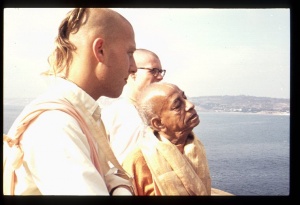CC Antya 3.104 (1975): Difference between revisions
(Vanibot #0027: CCMirror - Mirror CC's 1996 edition to form a basis for 1975) |
(Vanibot #0020: VersionCompareLinker - added a link to the Version Compare feature) |
||
| Line 2: | Line 2: | ||
<div style="float:left">'''[[Sri Caitanya-caritamrta (1975)|Śrī Caitanya-caritāmṛta (1975)]] - [[CC Antya (1975)|Antya-līlā]] - [[CC Antya 3 (1975)|Chapter 3: The Glories of Śrīla Haridāsa Ṭhākura]]'''</div> | <div style="float:left">'''[[Sri Caitanya-caritamrta (1975)|Śrī Caitanya-caritāmṛta (1975)]] - [[CC Antya (1975)|Antya-līlā]] - [[CC Antya 3 (1975)|Chapter 3: The Glories of Śrīla Haridāsa Ṭhākura]]'''</div> | ||
<div style="float:right">[[File:Go-previous.png|link=CC Antya 3.103 (1975)|Antya-līlā 3.103]] '''[[CC Antya 3.103 (1975)|Antya-līlā 3.103]] - [[CC Antya 3.105 (1975)|Antya-līlā 3.105]]''' [[File:Go-next.png|link=CC Antya 3.105 (1975)|Antya-līlā 3.105]]</div> | <div style="float:right">[[File:Go-previous.png|link=CC Antya 3.103 (1975)|Antya-līlā 3.103]] '''[[CC Antya 3.103 (1975)|Antya-līlā 3.103]] - [[CC Antya 3.105 (1975)|Antya-līlā 3.105]]''' [[File:Go-next.png|link=CC Antya 3.105 (1975)|Antya-līlā 3.105]]</div> | ||
{{CompareVersions|CC|Antya 3.104|CC 1975|CC 1996}} | |||
{{RandomImage}} | {{RandomImage}} | ||
==== TEXT 104 ==== | ==== TEXT 104 ==== | ||
| Line 11: | Line 10: | ||
<div class="verse"> | <div class="verse"> | ||
:kona-prakāre haridāsera chidra nāhi pāya | :kona-prakāre haridāsera chidra nāhi pāya | ||
:veśyā-gaṇe | :veśyā-gaṇe āni' kare chidrera upāya | ||
</div> | </div> | ||
| Line 18: | Line 17: | ||
<div class="synonyms"> | <div class="synonyms"> | ||
kona-prakāre—by any means; haridāsera—of Haridāsa Ṭhākura; chidra—fault; nāhi—not; pāya—gets; veśyā-gaṇe—prostitutes; | kona-prakāre—by any means; haridāsera—of Haridāsa Ṭhākura; chidra—fault; nāhi—not; pāya—gets; veśyā-gaṇe—prostitutes; āni'-bringing; kare—makes; chidrera upāya—a means to find some fault. | ||
</div> | </div> | ||
| Line 32: | Line 31: | ||
<div class="purport"> | <div class="purport"> | ||
This is typical of atheistic men, but even among so-called religionists, sādhus, mendicants, sannyāsīs and brahmacārīs, there are many enemies of the Kṛṣṇa consciousness movement who always try to find faults in it, not considering that the movement is spreading automatically by the grace of Lord Śrī Caitanya Mahāprabhu, who wanted it spread all over the world, in every town and village. We are trying to fulfill the | This is typical of atheistic men, but even among so-called religionists, sādhus, mendicants, sannyāsīs and brahmacārīs, there are many enemies of the Kṛṣṇa consciousness movement who always try to find faults in it, not considering that the movement is spreading automatically by the grace of Lord Śrī Caitanya Mahāprabhu, who wanted it spread all over the world, in every town and village. We are trying to fulfill the Lord's desire, and our attempt has become fairly successful, but the enemies of this movement unnecessarily try to find faults in it, exactly like the old rascal Rāmacandra Khān, who opposed Haridāsa Ṭhākura. | ||
</div> | </div> | ||
Latest revision as of 00:56, 27 January 2020

A.C. Bhaktivedanta Swami Prabhupada
TEXT 104
- kona-prakāre haridāsera chidra nāhi pāya
- veśyā-gaṇe āni' kare chidrera upāya
SYNONYMS
kona-prakāre—by any means; haridāsera—of Haridāsa Ṭhākura; chidra—fault; nāhi—not; pāya—gets; veśyā-gaṇe—prostitutes; āni'-bringing; kare—makes; chidrera upāya—a means to find some fault.
TRANSLATION
By no means could he find any fault in the character of Haridāsa Ṭhākura. Therefore he called for local prostitutes and began a plan to discredit His Holiness.
PURPORT
This is typical of atheistic men, but even among so-called religionists, sādhus, mendicants, sannyāsīs and brahmacārīs, there are many enemies of the Kṛṣṇa consciousness movement who always try to find faults in it, not considering that the movement is spreading automatically by the grace of Lord Śrī Caitanya Mahāprabhu, who wanted it spread all over the world, in every town and village. We are trying to fulfill the Lord's desire, and our attempt has become fairly successful, but the enemies of this movement unnecessarily try to find faults in it, exactly like the old rascal Rāmacandra Khān, who opposed Haridāsa Ṭhākura.